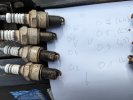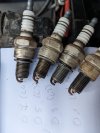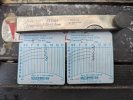hef19898
Well-Known Member
Hi all,
well, it's been a while since visited here... mainly two reasons so, one the old RRC was running fine (-ish, well, good enough) and the care she needed was only available at a workshop, since the one week-end job of replacing the camshaft did materialize for over a year. The seocnd reason was a new job, and the resulting lack of time to do anything else than doing some small bits of work in order to get her through her 2-year technical inspection.
So, the new cam shaft is in, a Kent H200. TÜV was passed successfully except for some small bits (the tow hook has to be reattached, I need new window wipers, a new front light bulb and a certificate for steel braided brake hoses). Since the new cam shaft is in so, there are some weird issues:
- loss of power when hot at above 2.5 to 3k rpm -> seemes solved with a new temp adjustment thingy (no idea how it really called) for the carbs
- impossible to consistently et idle rpm to below 1k without the engine dying (was no issue for emissions testing, but still not normal)
- engine blow back -> the exhaust had some holes, which are now welded; it happens independent of acceleration and load, with a tendency to happen more often with a warm engine and when going of the gas, it does happen regardless even when cold and idling
I did check the workshop manual, and since it is not happening when accelerating, I think it is related to the valves and /or valve springs along the rocker. At least symptoms are inline with what the manual says.
Now i have two general questions:
1) is the root cause correct? I don't want to spend money on parts and mechanics for nothing
2) if it is the valves, springs and rocker, I am very inclined in going straight for upgrade two on my list: new cylinder heads, and new rocker assemblies as those aren't that expensive. The engine isn't really tuned, with the exception of the new cam shaft, so I am thinking of stage one heads. back the day, I looked at V8 Development heads or the gas flow ported ones from Turner Engineering. Any experience or opinion of those two options? Price wise they are very similar.
Anyway, I hope you didn't mind a very prolonged absence, it looks like I might be a bit more active again in the near future!
Greetings!
well, it's been a while since visited here... mainly two reasons so, one the old RRC was running fine (-ish, well, good enough) and the care she needed was only available at a workshop, since the one week-end job of replacing the camshaft did materialize for over a year. The seocnd reason was a new job, and the resulting lack of time to do anything else than doing some small bits of work in order to get her through her 2-year technical inspection.
So, the new cam shaft is in, a Kent H200. TÜV was passed successfully except for some small bits (the tow hook has to be reattached, I need new window wipers, a new front light bulb and a certificate for steel braided brake hoses). Since the new cam shaft is in so, there are some weird issues:
- loss of power when hot at above 2.5 to 3k rpm -> seemes solved with a new temp adjustment thingy (no idea how it really called) for the carbs
- impossible to consistently et idle rpm to below 1k without the engine dying (was no issue for emissions testing, but still not normal)
- engine blow back -> the exhaust had some holes, which are now welded; it happens independent of acceleration and load, with a tendency to happen more often with a warm engine and when going of the gas, it does happen regardless even when cold and idling
I did check the workshop manual, and since it is not happening when accelerating, I think it is related to the valves and /or valve springs along the rocker. At least symptoms are inline with what the manual says.
Now i have two general questions:
1) is the root cause correct? I don't want to spend money on parts and mechanics for nothing
2) if it is the valves, springs and rocker, I am very inclined in going straight for upgrade two on my list: new cylinder heads, and new rocker assemblies as those aren't that expensive. The engine isn't really tuned, with the exception of the new cam shaft, so I am thinking of stage one heads. back the day, I looked at V8 Development heads or the gas flow ported ones from Turner Engineering. Any experience or opinion of those two options? Price wise they are very similar.
Anyway, I hope you didn't mind a very prolonged absence, it looks like I might be a bit more active again in the near future!
Greetings!


